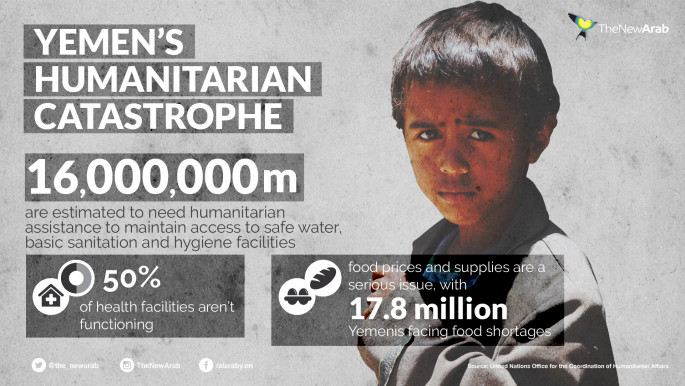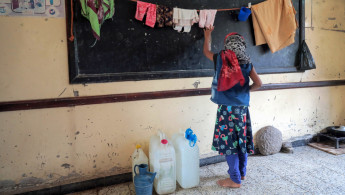"Several donors - including the Kingdom of Saudi Arabia, the United Arab Emirates and Kuwait, who have a particular responsibility, which they have discharged in recent years - have so far given nothing" to this year's aid plan, UN under-secretary-general for humanitarian affairs Mark Lowcock said, in a rare direct rebuke of member states.
"It is particularly reprehensible to promise money, which gives people hope that help may be on the way, and then to dash those hopes by simply failing to fulfill the promise,” Lowcock added, warning the Security Council that the "specter of famine has returned" in Yemen.
The 'dressing down' prompted swift action by Kuwait who on Thursday said it would donate $20 million towards humanitarian aid for Yemen, diplomats said.
Kuwaiti Foreign Minister Ahmad Nasser Al-Mohammad Al-Sabah made the announcement during a video conference meeting behind closed doors.
The UK's Foreign Secretary also announced on Thursday £5.8 million in new aid to help avert a famine in Yemen, taking the UK's total contribution since the conflict began to over £1 billion.
 |
It is particularly reprehensible to promise money, which gives people hope that help may be on the way, and then to dash those hopes by simply failing to fulfill the promise |  |
London says its support will help at least 500,000 vulnerable people to buy food and household essentials including soap and medicines each month.
The session - organised by Germany, Kuwait, Sweden and Britain - also included the four other permanent Security Council members (China, France, Russia and the United States) and the European Union.
Twitter Post
|
Other countries announced aid pledges during the meeting, but details were not given, diplomats said.
In June, a donor summit aiming to raise $2.41 billion in humanitarian aid for Yemen only managed to gather half of the amount, with key player UAE donating no funds.
Some $1.35 billion were raised at the emergency virtual conference that was co-hosted by Saudi Arabia in the fifth year of its military intervention.
"Aid agencies estimate they will need up to $2.41 billion to cover essential aid from June until December, including programmes to counter Covid-19," UN Secretary General Guterres said at the time.
Saudi Arabia, a key player in the conflict, emerged as the biggest donor at the event, pledging an aid package worth $500 million.
Britain, a leading arms supplier to Saudi Arabia, stepped in with a new aid package for Yemen worth £160 million ($200 million).
The United States, another weapons provider to the kingdom, said it would offer $225 million, while Germany announced 125 million euros ($139.8 million) in assistance to Yemen.
The United Arab Emirates pledged no funding at the conference despite being another key player in Yemen's conflict, as well as its 'troublesome' activities in the south of the country.
Just two months later, the UN confirmed only half of the pledges came through and only 30 percent of what it needs to help those who depend on aid for their survival.
 |
The UN warned this week that the 'specter of famine has returned' in Yemen |  |
"It is extremely disappointing that only about half of the $1.35 billion in humanitarian aid pledged in June has actually been paid," Assistant Secretary-General for Humanitarian Affairs Ramesh Rajasingham told the UN Security Council in August.
This week's virtual conference came as the UK's foreign secretary Dominic Raab warned that Yemen has "never looked more likely to slide into famine."
Raab said the humanitarian situation in Yemen is rapidly deteriorating and the war-torn country is now more than ever at risk of mass starvation.
Twitter Post
|
Also this week, Human Rights Watch warned on Monday of "deadly consequences" as a result of the obstruction of aid in war-torn Yemen, where the humanitarian effort has already been badly hit by the coronavirus crisis.
Interference by the government and Houthi rebels has hampered the delivery of aid in the country where the risk of famine looms large, the rights group wrote in a report.
Interviews with 35 humanitarian workers, 10 donor officials and 10 Yemeni health workers revealed a complex web of restrictions that hinder the flow of aid.
More than 100,000 people, mostly civilians, have been killed in the Yemen conflict, which the United Nations describes as the world's worst humanitarian crisis.
The United Nations warned in July that Yemen was at risk of returning to "the brink of a full-scale famine" as calls intensified for a ceasefire to help combat the novel coronavirus.
Long delays in approving aid projects, obstruction of aid surveys, and efforts to dictate allocation, alongside violence towards aid workers, all frustrated the flow of essentials, the report said.
Aid workers had to "push back" against Houthi insurgents who insisted they hand over cars, laptops and mobile phones when projects concluded in 2019 and 2020.
The UN's World Food Programme last year temporarily suspended deliveries to rebel-held areas following accusations of "diversion of food", after which the Houthis dropped a threat to impose a tax on aid.
 |
More than three million Yemenis have been displaced and three-quarters of Yemen's population of 29 million depend on some form of aid for survival |  |
Obstacles to aid delivery in government-held areas in the south and east were also on the rise, HRW said.
The report also criticised aid agencies for giving in to illegitimate demands, potentially worsening the situation - particularly in Houthi-held areas.
Unnecessary obstacles
Their actions had "encouraged the authorities to seek ever-greater control... channelling vast amounts of money to clearly corrupt ministries", HRW said.
The report urged both the government and the Houthis to "immediately lift all unnecessary obstacles" to the delivery of life-saving aid, demand for which has exploded since the coronavirus pandemic.
Yemen has so far recorded more than 2,000 Covid-19 cases, including 583 deaths, but numbers are likely much higher, the UN says.
 |
|
| Click to enlarge |
More than three million Yemenis have been displaced and three-quarters of Yemen's population of 29 million depend on some form of aid for survival, the UN says.
The UN humanitarian coordinator for Yemen, Lise Grande, said the UN was alert to the challenges of delivering aid in Yemen.
"For every programme we have underway, we identify the risks to principled delivery," she told AFP. "When those principles are breached, we adjust our delivery - this means that we sometimes have to stop aid."
She warned last month millions of Yemenis will "suffer and could die" because of a funding crisis that has forced the UN to close or slash half of its major programmes in Yemen.
Grande also said the aid situation was complicated after the Houthis closed Sanaa airport. The rebels have long threatened to shut down the facility to protest an air blockade by the Saudi-led coalition.
"Now with the airport in Sanaa closed, it makes an already extremely difficult task yet more difficult in terms of implementing a response," an aid worker, who spoke on condition of anonymity, told AFP.
"It's true in the south there are restrictions too, but... in the north, the amount of restrictions and their severity is exceptional."
Agencies contributed to this report.
Follow us on Facebook, Twitter and Instagram to stay connected



